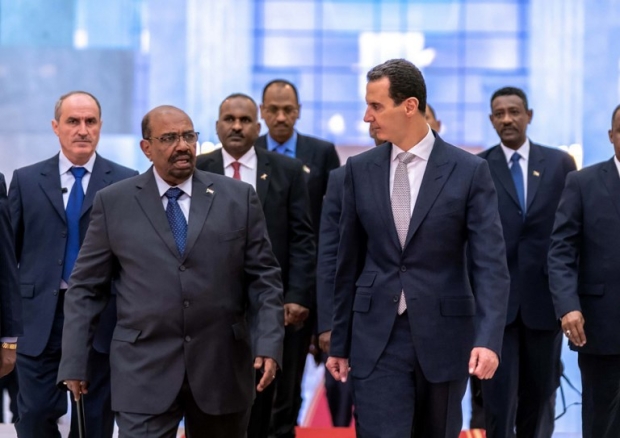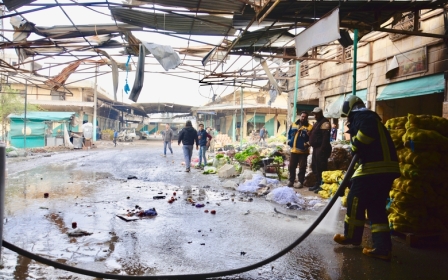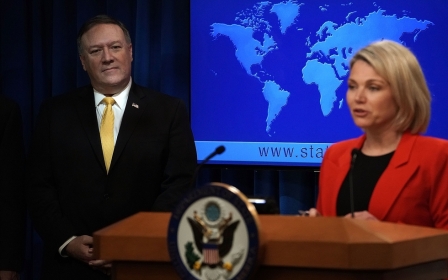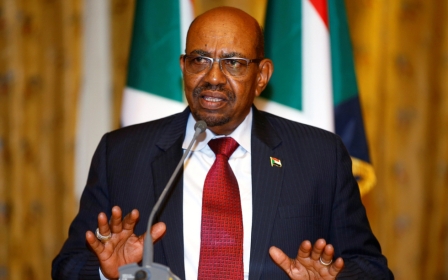When Bashir met Bashar: Sudan's president visits Damascus to meet Assad
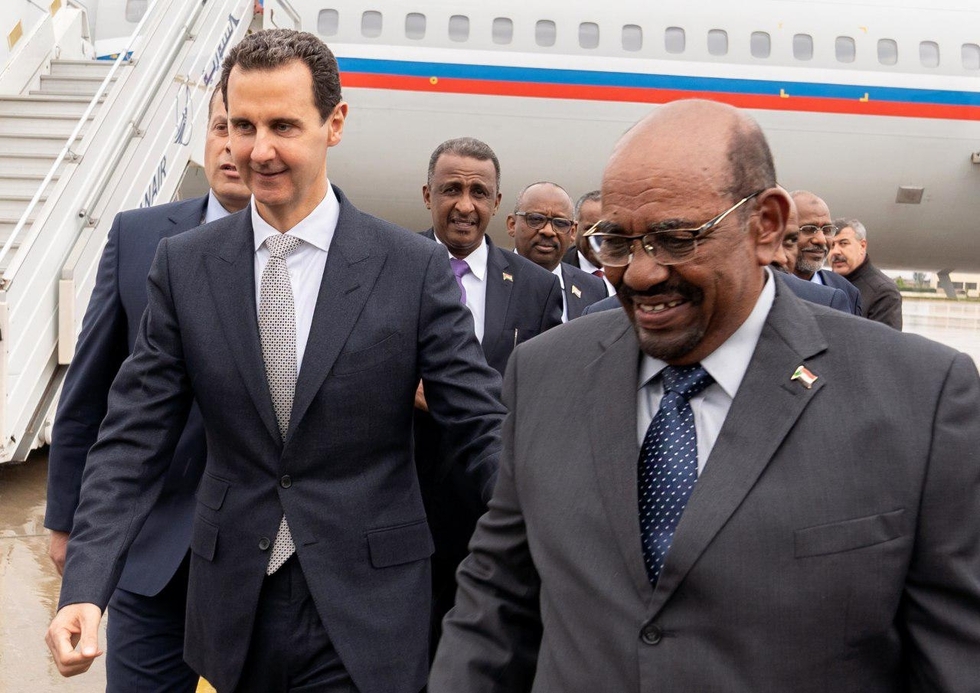
Sudanese President Omar al-Bashir visited Damascus on Sunday, Syrian state media reported, in his first such visit to the war-torn country since the start of the conflict.
Bashir's visit makes him the first Arab League leader to visit Assad as his forces, backed by Iranian militias and Russian jets, draw closer to taking full control of the country.
"President Omar Hassan al-Bashir... arrived this afternoon on a visit to the Syrian Arab Republic," the Syrian Arab News Agency (SANA), an official state media outlet, reported.
Assad went to meet the Sudanese president at Damascus airport on Sunday afternoon, according to the state media outlet.
They discussed the "situations and crises faced by many Arab countries", it said.
The two leaders also stressed the need to build "new principles for inter-Arab relations based on the respect of the sovereignty of countries and non-interference in internal affairs".
A Sudanese official said late on Sunday that Bashir had returned to Khartoum "from an important visit" to the Syrian capital.
The Sudanese president last visited the Syrian capital in 2008 for the Arab League summit which was held there that year.
'New alliance between the regional dictators'
On Monday, Sudanese opposition figures condemned Bashir's meeting with Assad, warning that the visit constitutes a “new alliance between the regional dictators”.
More than 400,000 people have been killed and millions more displaced since Syria's war started in 2011. It has since spiralled into a complex conflict involving militants, such as the Islamic State group, and several world powers.
The International Criminal Court has issued arrest warrants for Bashir for genocide, war crimes and crimes against humanity, but the Sudanese leader has continued to travel to many countries in the Middle East and Africa.
Fadlallah Burma Nasser, the deputy leader of Sudan's National Umma party (NUP), told Middle East Eye that Bashir's visit is "useless for the Sudanese [people], as well as for Syria".
What Syria and Bashar can do for Sudan to solve the country crises? Nothing
- Fadlallah Burma Nasser, Sudanese opposition figure
Nasser further downplayed the visit, saying it only signals that the two dictators are willing to continue repressing their own citizens.
"What can Syria and Bashar do for Sudan to solve the country's crises? Nothing," he told Middle East Eye.
"The two countries are suffering from the destruction of infrastructure, economic crises, and the use of massive violence against peaceful protesters," Nasser said.
Allying with Russia
Fathi Fadul, a spokesman for Sudan's Communist Party, told MEE that Bashir is trying to maintain his grip on power by allying with Russia and its friends in the region.
Earlier this year, the Sudanese president attended a meeting of the Organisation of Islamic Cooperation in Istanbul and he attended an Arab League summit in Jordan last year. In July, he also travelled to Moscow to meet Russian President Vladimir Putin.
"The visit to Damascus seems like it was done under pressure and supervision from Russia, which is trying to form a new alliance of countries that include Turkey, Iran and Qatar," Fadul said.
The visit to Damascus seems like it was done under pressure and supervision from Russia
- Fathi Fadul, Sudanese Communist Party spokesman
"However all these manoeuvres won’t solve the crisis in Sudan. We say to the Syrian regime that Bashir is not representing the Sudanese people," he said.
Salah Al-Doma, a Sudanese political analyst, told MEE that Khartoum is playing on regional alliances of Russia and the US and tries to exploit the conflict of interests for the benefits of Sudan.
Sudan has sought to normalise its relations with the US since Washington last year lifted US sanctions on Khartoum, which were imposed in the 1990s due to its support for Islamist militant groups.
Last month, the US said it was prepared to consider removing Sudan from its list of state sponsors of terrorism in return for progress in six key areas, including "closer counter-terrorism cooperation".
"Sudan's foreign policy depends on extorting the critical situation of regional players ... such as Iran, Saudi Arabia and [United Arab Emirates], in return for their help in breaking Sudan's international isolation or easing the economic crisis," al-Doma said.
But Saudi Arabia has been under pressure in the aftermath of the murder of journalist Jamal Khashoggi, and its ties with Washington have been strained as a result of the case, al-Doma said.
That suggests that Riyadh may be too busy to stick its neck out for Khartoum, which was a key player in the Saudi-led coalition that launched a war on Yemen in 2015, al-Doma said.
"Bashir faces a complex situation and would get nothing from his adventure" in Syria, he said. "Syria has nothing to offer him and Saudi Arabia is embroiled in Khashoggi's killing, so even the natural allies are facing deep changes and challenges."
New MEE newsletter: Jerusalem Dispatch
Sign up to get the latest insights and analysis on Israel-Palestine, alongside Turkey Unpacked and other MEE newsletters
Middle East Eye delivers independent and unrivalled coverage and analysis of the Middle East, North Africa and beyond. To learn more about republishing this content and the associated fees, please fill out this form. More about MEE can be found here.


